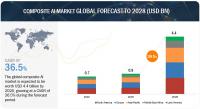(EMAILWIRE.COM, January 09, 2024 ) The Global Synthetic Soil Conditioners Market was valued at USD 2.15 billion and is projected to reach a market size of USD 4.44 billion by the end of 2030. Over the forecast period of 2024-2030, the market is projected to grow at a CAGR of 9.5 %.
Get Free Sample TOC @ https://virtuemarketresearch.com/report/synthetic-soil-conditioners/request-sample
A pivotal long-term driver propelling the Synthetic Soil Conditioners Market is the increasing global population. With more mouths to feed, the pressure on agriculture to produce higher yields is greater than ever. Synthetic soil conditioners play a crucial role in this scenario, offering a means to enhance soil structure and fertility, thereby augmenting crop yields. This fundamental driver is expected to sustain market growth in the coming years.
The COVID-19 pandemic brought about unprecedented challenges to various industries, and the Synthetic Soil Conditioners Market was no exception. The pandemic disrupted supply chains, leading to sporadic shortages of key raw materials. Additionally, lockdowns and restrictions on movement hindered agricultural activities, affecting the demand for synthetic soil conditioners. However, as the world gradually emerges from the crisis, the market is showing signs of recovery, driven by renewed focus on food security and sustainable agricultural practices.
In the short term, climate variability stands out as a prominent driver influencing the Synthetic Soil Conditioners Market. Fluctuations in temperature and rainfall patterns can have a direct impact on soil health and fertility. Synthetic soil conditioners offer a flexible solution to mitigate these challenges, aiding in the retention of moisture and nutrients essential for plant growth. As climate change continues to be a pressing concern, the demand for these products is expected to rise in response to the need for adaptive agricultural practices.
An exciting opportunity in the Synthetic Soil Conditioners Market lies in the growing adoption of precision agriculture techniques. Precision agriculture leverages advanced technologies, such as GPS, drones, and IoT sensors, to optimize farm management practices. Synthetic soil conditioners complement these technologies by providing a tailored approach to soil enhancement, ensuring that resources are used efficiently. This synergy is anticipated to drive market growth as precision agriculture gains traction worldwide.
A notable trend observed in the industry is the shift towards sustainable and eco-friendly formulations of synthetic soil conditioners. Manufacturers are increasingly focusing on developing products that have minimal environmental impact, using biodegradable materials and adopting eco-conscious production processes. This trend aligns with the broader movement towards sustainable agriculture, reflecting a growing awareness of the importance of preserving natural resources for future generations.
Read More @ https://virtuemarketresearch.com/report/synthetic-soil-conditioners
Market Segmentation:
By Product Type:
Polyacrylamide
Polyacrylate
Polyvinylpyrrolidone
Polysaccharides
Others
Among these, the largest segment is Polyacrylamide (PAM). PAM-based conditioners are known for their excellent water retention properties, making them highly effective in improving soil structure. They play a crucial role in preventing soil erosion and enhancing nutrient availability to plants. Another noteworthy observation is that Polyacrylate (PA) is poised to be the fastest-growing product type during the forecast period. Polyacrylate-based conditioners exhibit exceptional water-absorbing capabilities, making them particularly valuable in arid regions where water conservation is paramount.
By Formulation:
Water Soluble
Hydrogels
In this regard, the largest segment is Water Soluble. These formulations dissolve readily in water, allowing for easy application and uniform distribution in the soil. Water-soluble conditioners are favored for their convenience and efficiency. On the other hand, Hydrogels represent the fastest-growing formulation during the forecast period. Hydrogels are three-dimensional networks that can absorb and retain large amounts of water, releasing it gradually to plants. This characteristic is especially beneficial in drought-prone regions, where water conservation is imperative.
By Soil Type:
Sand
Clay
Loam
Others
Different soil types have distinct characteristics that influence their suitability for agriculture. In the Synthetic Soil Conditioners Market, the largest segment is Loam. Loam soil is considered ideal for farming due to its balanced mixture of sand, silt, and clay. It provides good drainage, retains moisture, and offers a suitable environment for plant roots to thrive. Loam soil is widely sought after by farmers for its versatility and fertility. Interestingly, the fastest-growing segment in this category is also Loam. This underscores the universal appeal and demand for this type of soil, indicating its continued significance in agricultural practices.
By Crop Type:
Cereals & Grains
Fruits & Vegetables
Turf & Ornamentals
Oilseeds & Pulses
Others
In this market segment, the largest category is Cereals & Grains. These crops form the cornerstone of global agriculture, providing sustenance for a significant portion of the population. Synthetic soil conditioners tailored to the needs of cereals and grains play a pivotal role in maximizing yields and ensuring food security. Looking ahead, the fastest-growing segment is projected to be Oilseeds & Pulses. The increasing recognition of the nutritional benefits of oilseeds and pulses is driving demand, necessitating specialized soil conditioners to optimize their growth and yield potential.
By End-Use:
Agriculture
Turf Management
Construction & Land Development
Other
Among these, the largest segment is Agriculture. This encompasses a wide range of agricultural practices, including crop cultivation, horticulture, and floriculture. Synthetic soil conditioners are integral to modern agricultural techniques, contributing to higher yields and sustainable farming practices. Conversely, the fastest-growing segment in terms of end-use is Construction & Land Development. This sector relies on soil conditioners to improve soil stability and structure for various construction projects, landscaping, and land development endeavors, reflecting a growing recognition of the importance of soil health beyond agriculture.
Customize This Report According to Your Needs – https://virtuemarketresearch.com/report/synthetic-soil-conditioners/customization
Regional Analysis:
Geographical variations play a crucial role in shaping the demand and preferences within the Synthetic Soil Conditioners Market. Within this context, North America emerges as the largest market segment. The region’s advanced agricultural practices and emphasis on sustainability contribute to the prominence of synthetic soil conditioners. However, during the forecast period, Asia-Pacific is projected to be the fastest-growing region. This can be attributed to the region’s expanding agricultural sector, coupled with a growing awareness of the benefits of synthetic soil conditioners in optimizing crop production and ensuring food security in densely populated countries across the Asia-Pacific region.
Latest Industry Developments:
Companies in the Synthetic Soil Conditioners Market are increasingly allocating resources towards research and development activities. This trend is driven by the need to introduce innovative formulations and products that address specific soil and crop requirements. Recent developments reflect a surge in investments in advanced technologies and sustainable materials, allowing companies to stay at the forefront of product innovation. By focusing on R&D, companies aim to differentiate themselves in a competitive landscape and offer tailored solutions that resonate with evolving customer demands.
A notable trend observed in the market involves companies forging strategic partnerships and collaborations with research institutions, agricultural organizations, and technology providers. These collaborations serve as conduits for knowledge exchange, enabling companies to leverage expertise and access cutting-edge technologies. Recent developments highlight joint ventures aimed at developing customized soil conditioning solutions, optimizing product efficacy, and expanding market reach. Through strategic partnerships, companies are able to tap into complementary strengths and resources, ultimately enhancing their market share and fostering sustainable growth.
Companies are increasingly aligning their strategies with sustainability goals, reflecting a broader industry shift towards eco-conscious practices. This trend is manifested through the development of synthetic soil conditioners with reduced environmental impact, utilizing biodegradable materials, and adopting eco-friendly production processes. Recent advancements showcase a growing emphasis on product formulations that minimize carbon footprint and promote soil health without compromising performance. By embracing sustainability, companies not only cater to the preferences of environmentally conscious consumers but also position themselves as responsible contributors to sustainable agriculture practices, thereby bolstering their market share.
About Us:
Virtue Market Research stands at the forefront of strategic analysis, empowering businesses to navigate complex market landscapes with precision and confidence. Specializing in both syndicated and bespoke consulting services, we offer in-depth insights into the ever-evolving interplay between global demand and supply dynamics. Leveraging our expertise, businesses can identify emerging opportunities, discern critical trends, and make decisions that pave the way for future success.










